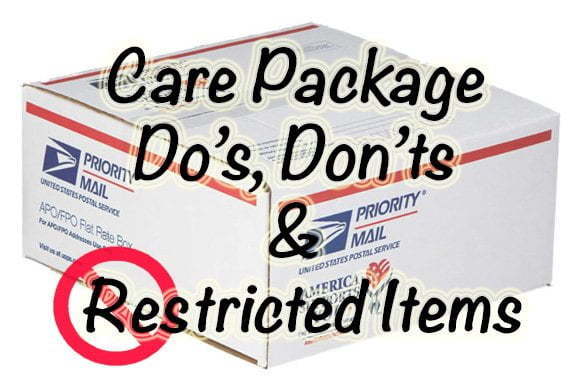When sending a care package to a servicemember overseas, it is important to remember that there are several guidelines and rules that must be followed both from the United States Post Office, but also Customs and the Military. Failure to do so could cause the package to be delayed or even confiscated at customs (or could get your servicemember in trouble)! Make sure you aren’t sending any restricted items!

DON’T
- Send Fluf (Marshmallow cream in a jar) – this has a tendency to explode due to most military planes not having pressurized cargo areas.
- Send Soda – again this has a great possibility that it will explode while in transit due to most military planes lacking pressurized cargo areas.
- Send a restricted item (see below).
DO
- Check with the USPS for specific restrictions on sending mail to a certain APO/FPO/DPO address. It varies greatly depending on what region (or country) they are in.
- Follow the regulations on sending tobacco to military members through the mail.
- List every single thing you are sending on the custom’s form! Use multiple custom forms, if necessary!
- Make sure the Military Unit does not have any certain restrictions on what cannot be sent.
- Tape your package securely (wrap several times if needed). Packages get tossed around a lot on their way to the servicemember (from the USPS, custom agents, and military personnel) so make sure to use plenty of tape!
- Put cards and letters in larger envelopes. I know this sounds crazy but letters and cards get lost a lot easier and misdirected to other places much more frequently than packages, simply due to their small size. On my husband’s last deployment, he only received about 25% of the letters I sent. In fact, one card got to him 2 months after I sent it. A soldier found it in a magazine and returned it (thankfully) and it was rerouted to my husband. And vis versa, my husband sent me letters. Out of the four he sent me, I only received two!
RESTRICTED ITEMS
When sending a care package always check to make sure that you are not sending a restricted item.
Each country has customs regulations that apply to all incoming mail. These may include prohibitions on certain kinds of food or entertainment products.
Military units may also have additional restrictions imposed by the unit commanders, such as those on size and weight, to ensure logistics support can handle the mail along with other necessities.
The maximum length of a package in any category is 72 inches. In addition, Military ZIP Code™ restrictions may be revised as military units move to different locations.
Although there are specific restrictions for each five-digit Military and Diplomatic Post Office ZIP Code (APO/FPO/DPO), generally, the following are prohibited in the region of Operation Iraqi Freedom and Operation Enduring Freedom:
- Obscene articles (prints, paintings, cards, films, videotapes, etc) and horror comics.
- Any item depicting nude or seminude persons, pornographic or sexual items, or non-authorized political materials; even if the item is of you.
- Bulk quantities of religious materials contrary to the Islamic faith. Items for the personal use of the addressee are permissible.
- Pork or pork by-products.
All applicable restrictions for about 3,000 overseas military ZIP Codes are entered into the United States Postal Service® computer terminals and published in the Postal Bulletin. Or, for specific restrictions to an APO/FPO location, you can call 1-800-ASK-USPS or consult your local Post Office.
Note: The intent of the customs prohibition against mailing religious items stems from the host country’s concern about distributing these materials to its citizens. Mailing a Bible or other individual religious item if it is solely for the personal use of the service member should not be an issue.




Hello Bridget, Your knowledge of military shipping is very adequate. I am currently employed with the USPS for 29+ years and work at the retail counter. Thank you for sharing and knowing what you write. Check out my awesome website Veteran Owned Business!